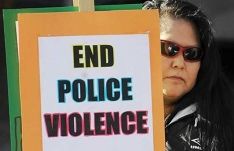Protest Against Pre-Olympic Police 'Street Sweeps'
'Stop the war on the poor', say DTES protesters
By MATT KIELTYKA, 24 HOURS
Dozens of protesters from the Downtown Eastside braved snow and wind Sunday to send a message to Vancouver police.
“Stop the war on the poor,” they chanted in front of the police station on Main Street during the latest protest aimed at condemning the city’s ticketing campaign – or crackdown, depending on who you ask – in the DTES.
“It’s about being treated like a human, with respect,” said Joan Morelli, one of the protesters with the DTES Women Centre’s Power to Women group.
“I’m not saying people should jaywalk or do illegal vending – because often they’re selling items stolen from me – but the way people are being treated is distasteful.”
Groups like Power to Women, Carnegie Community Action Project and Pivot Legal Society have been holding regular protest actions since seeing a 50 per cent spike in tickets police have been issuing in the DTES last year.
They claim the increased enforcement of minor bylaws – and the crackdown in street-level vending – is criminalizing poverty and helping the city aggressively clean-up the impoverished neighbourhood for the Olympics.
“You don’t see this kind of enforcement in Kitsilano or other parts of the city,” said an organizer known as Chili Bean. “There is an enormous police presence because of the Olympics, but we still live here. This is our neighbourhood.”
Downtown Eastside residents protest police 'street sweeps'
CBC News, Sunday, March 15, 2009
Residents of Vancouver's poverty-stricken Downtown Eastside protested Sunday against what they see as a pre-Olympic police strategy to drive them off the streets through petty ticketing and random identification checks.
About 100 people showed up outside a police station on Main Street — formerly the department's headquarters — in the heart of the gritty neighbourhood.
Pelted by wet snow flurries, speakers angrily rejected the police business plan that calls for more tickets to be issued for bylaw infractions such as jaywalking and street vending — laws they say aren't enforced in Vancouver's nicer neighbourhoods.
Clyde Wright of the Vancouver Area Network of Drug Users said members "have been ticketed for offences such as stepping off the curb unsafely, riding a bicycle on the sidewalk, having no helmet, having no bell on their bike."
The police plan calls for more summons to be issued to enforce the fines, which Wright said are a hardship on residents living on social assistance.
"This is targeted harassment of poor people," he told the rally.
Protesters set up a sidewalk sale hoping to attract police attention, but officers stayed clear, instead blocking the street to traffic as the rally spilled off the sidewalk.
Crackdown aims to make streets safer: police
The police business plan, released in January, outlines various tactics it says is aimed at curbing street disorder in what is perhaps the poorest neighbourhood in Canada.
It sets targets for charges under the provincial Safe Streets Act and Trespass Act and requires each police Beat Enforcement Team shift to conduct a minimum number of identification checks in the neighbourhood.
Another tactic involves not laying charges for simple drug possession, instead seizing the drugs to avoid lengthy paperwork that keeps officers off the street for hours at a time.
No one from the Vancouver Police Department was available Sunday to comment on the protesters' complaints, but spokespeople in the past have
said police are trying to crack down on street disorder because residents want to feel safe.
But David Eby, president of the B.C. Civil Liberties Association, who attended the rally, said he believes the 2010 Winter Games have a lot to do with the plan.
"It's hard for me to imagine this isn't related to the Olympics," he said.
"It's an entirely new initiative. More tickets than have ever been given out in a very short period of time.
"The goal is to harass the people who are living on the street down here, who are addicted to drugs or mentally ill or just too poor to even survive anywhere else. To harass them into other neighbourhoods and spread the problem out over the city."
